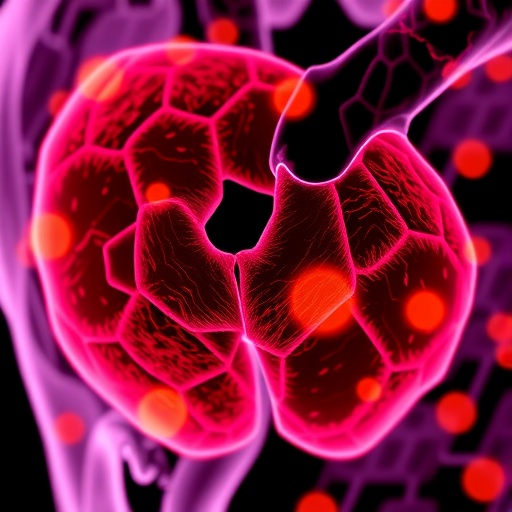In a groundbreaking study that has implications for cancer diagnostics and treatment, researchers have unveiled a novel six-biomarker panel derived from male breast cancer-associated fibroblasts. This innovative discovery is particularly interesting as it highlights the significant overlap between two ostensibly disparate cancers: male breast cancer and prostate tumors. The study, led by Talia et al., provides new insights into how the tumor microenvironment can influence cancer progression and patient prognosis.
At the core of this research is the recognition that male breast cancer, although rare, shares several biological characteristics with prostate cancer. Fibroblasts, which are the most prevalent cells in connective tissue, play a critical role in the tumor microenvironment. By examining the fibroblasts associated with male breast cancer, the researchers were able to pinpoint six specific biomarkers that exhibited predictive power for prostate cancer outcomes. This crossover suggests that insights gained from one cancer type can potentially illuminate pathways and treatment options in another.
The researchers employed advanced bioinformatics and proteomic analysis methods to identify the biomarkers. They meticulously analyzed the fibroblast populations associated with male breast tumors, utilizing high-throughput sequencing technologies that enabled them to detect subtle differences in gene expression. This meticulous process allowed them to isolate the six biomarkers of interest, which were shown to correlate with clinical outcomes in prostate cancer patients.
One of the most impressive aspects of this research is its potential translational impact on clinical practice. By integrating these biomarkers into routine diagnostic workflows, healthcare providers could enhance their ability to stratify patients based on risk profiles. This could lead to more personalized treatment plans, ultimately improving patient outcomes. The authors emphasized that the biomarkers not only provide prognostic information but also may reveal novel therapeutic targets that could be exploited in prostate cancer treatment.
Furthermore, the implications of these findings extend beyond the immediate benefits for prostate cancer prognosis. By providing a clearer understanding of the role that stromal components play in tumor biology, the research paves the way for a more comprehensive approach to cancer treatment. The identification of these biomarkers could stimulate further investigation into how male breast cancer, male-specific hormonal environments, and tumorigenesis are interlinked.
The integration of multi-omic data, including genomics, proteomics, and metabolomics, has become increasingly valuable in understanding complex diseases like cancer. This study harnessed this approach, revealing that male breast cancer-associated fibroblasts might share unique signaling pathways with prostate tumors. The resulting biomarkers are a testament to the intricate interplay between different cancer types and the microenvironments in which they develop.
In addition, these findings resonate within the broader context of sex-specific differences in cancer biology. Male patients may experience unique tumor dynamics that are underrepresented in conventional research primarily focused on female breast cancer or generic prostate cancer profiles. This study therefore shines a light on an underexplored area of cancer biology that warrants greater attention from researchers and clinicians alike.
The rigorous validation of these biomarkers is essential for their future clinical application. The study’s authors have indicated their commitment to validating the efficacy of these markers in larger, multicentric cohorts of prostate cancer patients. They anticipate that this validation could lead to the establishment of clinical guidelines that incorporate these biomarkers for enhanced patient management.
By heralding this novel six-biomarker panel, researchers not only provide hope for improved cancer prognostication but also open avenues for exploring the therapeutic manipulation of these pathways. If successfully translated into clinical practice, such advancements could represent a significant leap forward in the fight against cancer, potentially leading to new drug development driven by the mechanisms uncovered in these fibroblasts.
As the field of oncology progresses, the importance of interdisciplinary research cannot be overstated. The collaboration between researchers from diverse biological backgrounds has allowed for a more holistic understanding of disease mechanisms. The findings of this study underscore the necessity of breaking down silos in cancer research, encouraging a more integrative approach that includes insights from different cancer types.
The study not only fills a critical gap in understanding the biomolecular relationships in cancer but also emphasizes the urgency of addressing male breast cancer, a condition often overlooked in discussions surrounding cancer research funding and awareness.
As researchers and clinicians continue to grapple with the complexities of cancer treatment, this novel six-biomarker panel offers a fresh perspective that may reshape prognostic strategies for prostate tumors. With further investigation, the hope is that targeted therapies designed around these biomarkers could lead to a more favorable prognosis for patients facing prostate cancer, ultimately enhancing their quality of life.
In summary, the discovery of this biomarker panel presents a promising frontier in cancer research, shedding light on the multifaceted nature of tumor biology. As scientists build on these findings, the convergence of insights from different types of cancer could lead to transformative changes in the landscape of cancer diagnostics and therapy. The research from Talia et al. serves as a powerful reminder of the potential hidden in our understanding of how different cancer types can inform one another, symbolizing hope for advancements in patient care.
Subject of Research: Male breast cancer-associated biomarkers and their prognostic power for prostate tumors.
Article Title: A novel six-biomarker panel identified from male breast cancer-associated fibroblasts demonstrates prognostic power for prostate tumors.
Article References:
Talia, M., Scordamaglia, D., Cirillo, F. et al. A novel six-biomarker panel identified from male breast cancer-associated fibroblasts demonstrates prognostic power for prostate tumors.
J Transl Med 23, 1090 (2025). https://doi.org/10.1186/s12967-025-07196-6
Image Credits: AI Generated
DOI: 10.1186/s12967-025-07196-6
Keywords: Male breast cancer, prostate tumors, biomarkers, fibroblasts, cancer prognosis, tumor microenvironment, proteomics, bioinformatics, cancer biology.




